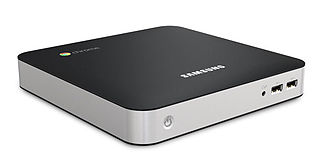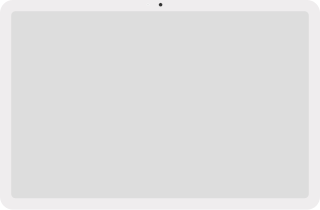
A netbook is a small and inexpensive laptop designed primarily as a means of accessing the Internet. Netbooks were sold from 2007 until around 2013, when the widespread advent of smartphones and tablets eclipsed their popularity.

Samsung Galaxy is a series of computing and Android mobile computing devices that are designed, manufactured and marketed by Samsung Electronics. The product line includes the Samsung Galaxy S series of high-end phones, Galaxy Z series of high-end foldables, Galaxy A series, Galaxy F series and Galaxy M series of mid-range phones, the Galaxy Book of laptops, the Samsung Galaxy Tab series, the Samsung Galaxy Watch, the Galaxy Buds series and the Galaxy Fit.

ChromeOS, sometimes styled as chromeOS and formerly styled as Chrome OS, is a Linux distribution developed and designed by Google. It is derived from the open-source ChromiumOS, based on the Linux kernel, and uses the Google Chrome web browser as its principal user interface.
Google Nexus is a discontinued line of consumer electronic mobile devices that ran a stock version of the Android operating system. Google managed the design, development, marketing, and support of these devices, but some development and all manufacturing were carried out by partnering with original equipment manufacturers (OEMs). Alongside the main smartphone products, the line also included tablet computers and streaming media players; the Nexus started out in January 2010 and reached its end in October 2016, replaced by Google Pixel family.
Chromebook is a line of laptop and tablet computers that runs using ChromeOS, an operating system developed by Google.

A 2-in-1 laptop, also known as 2-in-1 PC, 2-in-1 tablet, laplet, tabtop, laptop tablet, or simply 2-in-1, is a portable computer that has features of both tablets and laptops.

A Chromebox is a small form-factor PC that runs Google's ChromeOS operating system. The first device debuted in May 2012.

The Nexus 10 is a tablet computer co-developed by Google and Samsung Electronics that runs the Android operating system. It is the second tablet in the Google Nexus series, a family of Android consumer devices marketed by Google and built by an OEM partner. Following the success of the 7-inch Nexus 7, the first Google Nexus tablet, the Nexus 10 was released with a 10.1-inch, 2560×1600 pixel display, which was the world's highest resolution tablet display at the time of its release. The Nexus 10 was announced on October 29, 2012, and became available on November 13, 2012.

The Chromebook Pixel is a 2013 laptop at the high end of Google's Chromebook family of machines, which all come preinstalled with ChromeOS operating system. The Chromebook Pixel is part of the Google Pixel series of consumer electronics. An updated model was released in 2015. Chromebook Pixel stopped receiving software and security updates in August 2018.
Google Pixel is a brand of portable consumer electronic devices developed by Google that run either ChromeOS or the stock version of the Android operating system. The main line of Pixel products consist of Android-powered smartphones, which have been produced since October 2016 as the replacement of the older Nexus, and of which the Pixel 8 and 8 Pro are the current models. The Pixel brand also includes laptop and tablet computers, as well as several accessories, and was originally introduced in February 2013 with the Chromebook Pixel.

The Google Assistant is a virtual assistant software application developed by Google that is primarily available on mobile and home automation devices. Based on artificial intelligence, The Google Assistant can engage in two-way conversations, unlike the company's previous virtual assistant, Google Now.

Fuchsia is an open-source capability-based operating system developed by Google. In contrast to Google's Linux-based operating systems such as ChromeOS and Android, Fuchsia is based on a custom kernel named Zircon. It publicly debuted as a self-hosted git repository in August 2016 without any official corporate announcement. After years of development, its official product launch was in 2021 on the first-generation Google Nest Hub, replacing its original Linux-based Cast OS.
The Pixel and Pixel XL are a pair of Android smartphones designed, developed, and marketed by Google as part of the Google Pixel product line, succeeding the Nexus line of smartphones. They were officially announced on October 4, 2016 at the Made by Google event and released in the United States on October 20. On October 4, 2017, they were succeeded by the Pixel 2 and Pixel 2 XL.

Google Lens is an image recognition technology developed by Google, designed to bring up relevant information related to objects it identifies using visual analysis based on a neural network. First announced during Google I/O 2017, it was first provided as a standalone app, later being integrated into Google Camera but was reportedly removed in October 2022. It has also been integrated with the Google Photos and Google Assistant app and with Bard as of 2023.

The Pixel Slate is a 12.3-inch tablet running ChromeOS. It was developed by Google and released on October 9, 2018, at the Made by Google event. In June 2019, Google announced it will not further develop the product line, and canceled two models that were under development. The Pixel Slate was removed from the Google Store in January 2021.
The Pixelbook Go is a portable touchscreen laptop computer developed by Google which runs ChromeOS. It was announced on October 15, 2019 as the successor to the Pixelbook, and shipments began on October 27 for the United States and Canada. The Pixelbook Go was later made available for the United Kingdom in January 2020. Unlike preceding Google-branded Chromebook devices, the Pixelbook Go is not considerably more expensive compared to Chromebooks with similar functionality and specifications.

Google Tensor is a series of ARM64-based system-on-chip (SoC) processors designed by Google for its Pixel devices. It was originally conceptualized in 2016, following the introduction of the first Pixel smartphone, though actual developmental work did not enter full swing until 2020. The first-generation Tensor chip debuted on the Pixel 6 smartphone series in 2021, and were succeeded by the Tensor G2 chip in 2022 and G3 in 2023. Tensor has been generally well received by critics.

The Pixel Tablet is an Android tablet designed, developed, and marketed by Google as part of the Google Pixel product line. It was previewed at the Google I/O keynote in May 2022 and announced in May 2023. It was released in June 2023. At launch, a charging speaker dock was sold with each device. However, a standalone version without the dock was released on May 14, 2024.








